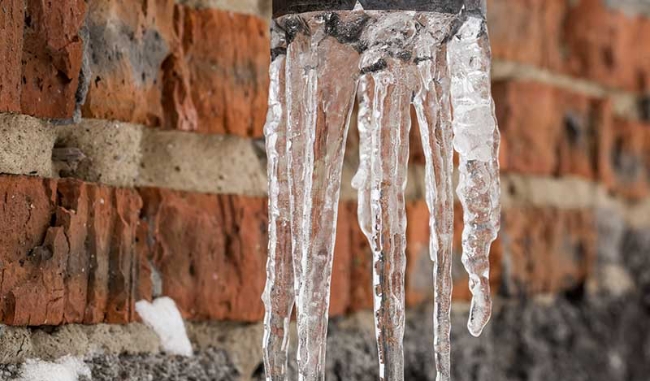Protect Against Frozen Pipes in Winter: Expert Advice
Protect Against Frozen Pipes in Winter: Expert Advice
Blog Article
In this article down the page you will discover a bunch of brilliant additional info in regards to How to Prevent Your Pipes From Freezing.

Winter can ruin your pipes, specifically by freezing pipes. Below's exactly how to prevent it from taking place and what to do if it does.
Introduction
As temperature levels decline, the danger of frozen pipes increases, possibly leading to pricey repair services and water damage. Recognizing how to prevent frozen pipes is important for home owners in cool climates.
Recognizing Frozen Pipes
What triggers pipelines to ice up?
Pipes ice up when exposed to temperature levels below 32 ° F (0 ° C) for prolonged periods. As water inside the pipes freezes, it broadens, taxing the pipeline wall surfaces and potentially causing them to burst.
Risks and damages
Frozen pipes can cause supply of water interruptions, residential or commercial property damages, and pricey fixings. Burst pipelines can flood homes and cause comprehensive structural damages.
Indications of Frozen Piping
Identifying icy pipelines early can prevent them from breaking.
Exactly how to recognize frozen pipes
Look for lowered water circulation from taps, uncommon odors or sounds from pipes, and noticeable frost on subjected pipes.
Prevention Tips
Insulating susceptible pipelines
Cover pipes in insulation sleeves or use heat tape to protect them from freezing temperature levels. Concentrate on pipes in unheated or external areas of the home.
Home heating techniques
Keep indoor areas sufficiently heated, particularly areas with plumbing. Open cupboard doors to allow cozy air to distribute around pipes under sinks.
Protecting Outdoor Plumbing
Yard hoses and exterior taps
Separate and drain pipes yard tubes prior to winter season. Set up frost-proof faucets or cover outdoor taps with insulated caps.
What to Do If Your Pipes Freeze
Immediate actions to take
If you presume icy pipelines, maintain faucets open to ease pressure as the ice thaws. Make use of a hairdryer or towels taken in hot water to thaw pipes gradually.
Long-Term Solutions
Architectural modifications
Consider rerouting pipelines away from outside wall surfaces or unheated areas. Add added insulation to attic rooms, basements, and crawl spaces.
Upgrading insulation
Invest in premium insulation for pipes, attics, and wall surfaces. Proper insulation assists preserve consistent temperatures and decreases the risk of icy pipelines.
Final thought
Protecting against frozen pipes calls for positive steps and fast feedbacks. By understanding the reasons, indications, and preventive measures, homeowners can secure their plumbing throughout cold weather.
6 Proven Ways to Prevent Frozen Pipes and Protect Your Home
Disconnect and Drain Garden Hoses
Before winter arrives, start by disconnecting your garden hoses and draining any remaining water. Close the shut-off valves that supply outdoor hose bibs and leave the outdoor faucet open to allow any residual water to drain. For extra protection, consider using faucet covers throughout the colder months. It’s also important to drain water from any sprinkler supply lines following the manufacturer’s directions.
Insulate Exposed Pipes
Insulating your pipes is an effective way to prevent freezing. Pipe insulation is readily available at home improvement stores and is relatively inexpensive. Pay close attention to pipes in unheated areas such as the attic, basement, crawl spaces, or garage. Apply foam insulation generously to create a buffer against the cold. You can also wrap your pipes in heat tape or thermostat-controlled heat cables for added warmth.
Seal Air Leaks
Inspect your home for any cracks or openings that could let in cold air. Seal any holes around the piping in interior or exterior walls, as well as the sill plates where your home rests on its foundation. Additionally, make sure to keep your garage door closed unless you’re entering or exiting. Leaving it open creates a significant air leak that can lead to frozen pipes.
Allow Warm Air Circulation
During cold snaps, it’s essential to allow warm air to circulate evenly throughout your home. Leave interior doors ajar to promote better airflow. Open kitchen and bathroom cabinets to help distribute heat consistently around the rooms. If you have small children or pets, be sure to remove any household chemicals or potentially harmful cleaners from open cabinets for safety.
Let Faucets Drip
A small trickle of water can make a big difference in preventing ice formation inside your pipes. When temperatures drop significantly, start a drip of water from all faucets served by exposed pipes. This continuous flow helps prevent the water from freezing. Additionally, running a few faucets slightly can relieve pressure inside the pipes, reducing the chances of a rupture if the water inside does freeze.
https://choateshvac.com/6-proven-ways-to-prevent-frozen-pipes-and-protect-your-home/

I found that piece about How to Prevent Your Pipes From Freezing while browsing on the search engines. Are you aware of somebody who is excited about the niche? Take a moment to share it. Thanks a lot for being here. Come back soon.
Free Quote Report this page